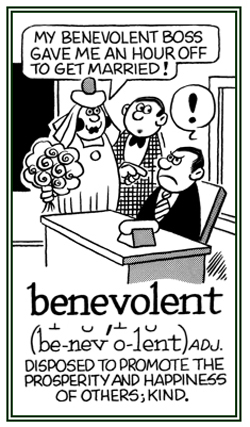poli-
(Latin: polire, to polish, to smooth, to shine; to refine)
The following cartoon is one example of an apple polisher!

Go to this Word A Day Revisited Index
so you can see more of Mickey Bach's cartoons.
Marie used a special pink nail polish most of the time because it was her favorite color.
Mr. Gregory, the salesman, made sure that all of the available wooden furniture in the store was shiny with the best polish available.
2. A good quality that comes from efforts or good practices: The movie star still has the polish in the film that people expected to see.3. An action that involves making something glossy: Lance, the artist, gave his statue another polish before the museum opened the exhibition for the public.
Mike and his sister were polishing the silverware in preparation for the family banquet for the following day.
2. To refine, to improve, or to add the finishing touches to something by making it better: Joe's son needs to polish up his German before he takes his exam in school in the ensuing week.The musical group polished up some new songs in preparation for the performance that was coming soon.
3. Etymology: from Old French poliss- and polir-, "to polish, to decorate"; from Latin polio, "to make smooth, to decorate, to embellish"; figuratively, "to refine, to improve".The banquet tables were carefully set up with polished drinking glasses and silverware.
2. Referring to a person who is skillful or impressive: The author, Mrs. Jackson, was congratulated for having written a more polished short story than those she had published previously.The moderator of the TV program reminded her guests that it isn't polite to interrupt other guests when they are talking.
The actress received some polite applause from the audience despite the fact that she made some blunders during the live performance.
2. Socially proper or correct; such as when speaking: Speech that is not offensive and which can be used in various situations can be referred to as being polite.There are some words which should not be expressed in polite company; particularly with people who expect good manners and decent speech.
3. Etymology: from Latin politus, "elegant, refined, accomplished"; literally, "polished"; from Latin polire, "to polish, to make smooth".2. Etymology: from French, from Old French, "cleanliness"; from Italian pulitezza, politezza, from Latin pulire, "to polish, to clean".
